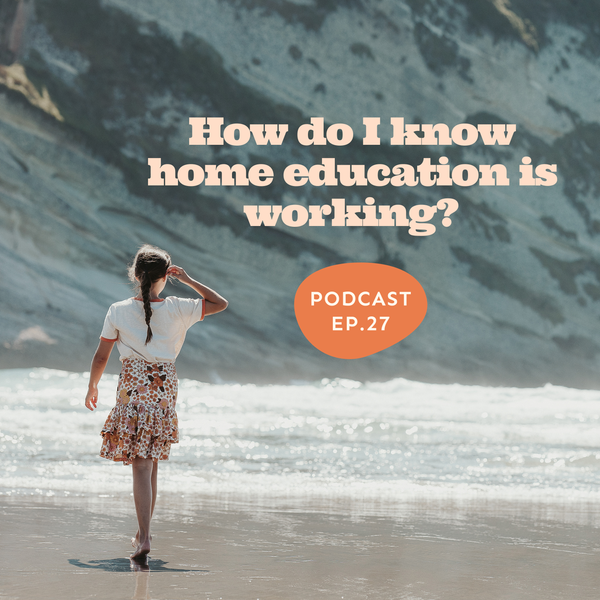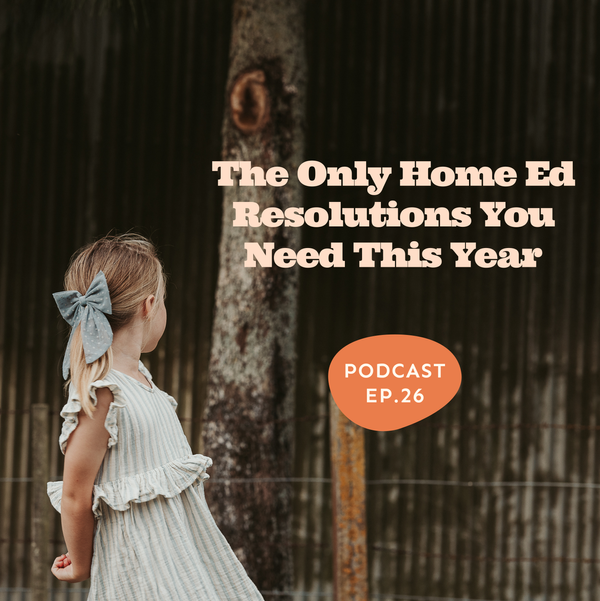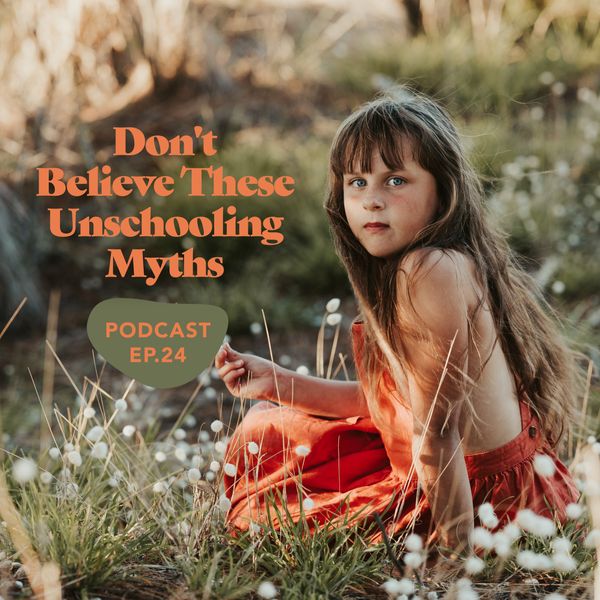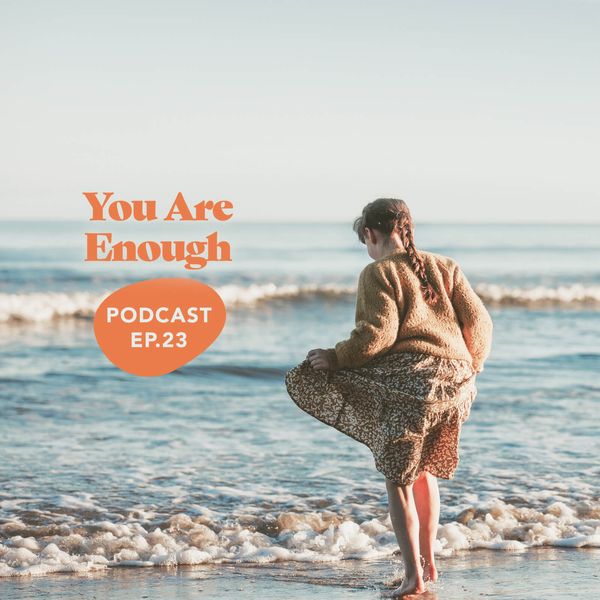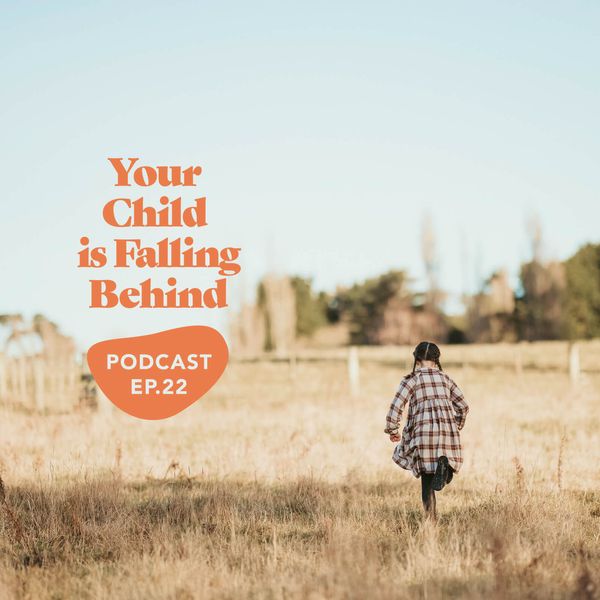In this episode, I’m taking you through seven things that will help set your family up for the best possible home educating year. These are all things that, through years of experience and reflection, I’ve found contribute the most to balance, personal growth, and fulfilment in our home.
From the importance of time, trust and personal space, to the management of screens, technology and other people’s expectations, there’s a lot in here for you to ponder on. For you to, maybe, take and apply to your own family life.
As you listen, can you let me know what you’re feeling most deeply? What hits home the most for your life, where you’re at right now?
I would love to hear from you as we set out on a fresh new year together :-)
These private episodes go even deeper, backed by research, the science of how children learn and grow, and more than a decade of lived home educating experience. Each one is designed to help you rethink, reframe, and recalibrate the way you're walking this path, giving you the confidence to live the version of life you want. The Collection is 23 episodes strong and counting, with over 10 hours of listening available right now.
As a subscriber, you'll also get immediate access to my self-paced course, expert-led masterclasses recordings, five downloadable guides, our school exemption documents, and more 💛
Show Notes
I wrote The Parent’s Guide to Designing a Life Without School because I believe that a good home education lifestyle doesn’t just happen, it needs to be designed. The beauty of home education is that you get to choose how you want to approach it. But, that’s also one of its biggest challenges. This guide will step you through the process of de-schooling to help you prepare your mental ground for new planting. And it will guide you through a process of reflection, giving you key takeaways you can apply to your life as a home educating family.
Complete Transcript
Helloooo and welcome to the Life Without School podcast, here to help you and your children live the life you want to, not just the one you’re told you should.
I’m Issy, a writer and home educating dad from New Zealand.
You can find my work at starkravingdadblog.com – all of my posts, podcast episodes, and short films created to encourage, support and reassure anyone walking this road less travelled.
Thank you so much for tuning in to listen today. Alright, let’s get into this week’s episode.
MUSIC
Hello, and Happy New Year to you and your family. Just like last year, I’m sure this holiday season has probably looked a bit different for you than other years, but I hope you’ve had a lovely time despite the many challenges we seem to be facing as a world right now.
2022! Can you even believe that’s what year it is? I can’t. I’m a child of the early 1980s, and 2022 is as far away from then as the 80s were from the 1930s. I just…can’t wrap my head around that. It’s actually been on my mind a bit, over the Christmas and New Year period. That…relentless march of time. And, underneath that, the importance of making that time count. In my mind, my eldest son could still be a toddler throwing spaghetti at me from his highchair, and then I hear this booming, deep voice coming down the hallway and it’s him…he’ll be 15 this year. My tiny, precious baby boy will be fifteen.
I’ve never really got into setting new year resolutions. It’s just never been an approach to improving myself, or my life, that sticks. But what I do like to do as the year ticks over to a new one is reflect back on some big areas of family life that are most important to me, and Kate, and our children. To think about things like our life flow and balance, and whether the way we’ve gone about that over the past year has allowed the right space for important things like personal growth and togetherness.
I like to think back on our best days from the year, and look at what made them so good. And then I do the same for the days that weren’t so good – why didn’t they go so well, and if we could go back in time – how would we make them better?
The answer to that is sometimes that we probably couldn’t have. And that’s fine. That’s…part of life. But I always, always find that when I sit down and quietly reflect back a few very clear things emerge. And now, having been doing this for a while, the things that bubble up as being most important are usually pretty similar to the year before. That’s how I know I’m on the right track. Incremental life gains are where it’s at it. Big, sweeping changes are often hard to make, and even harder to maintain. Sometimes they’re needed, but I find the best way to make lasting, meaningful change to my life is to identify areas that I know can be incrementally improved and then I work to stay super conscious of them.
I call them out like I’ll do here today, I’ll digest them, and then I’ll make sure they’re part of how I think about every week.
This is what I find most exciting about the whole home education thing. About choosing to live a life without school. We’re in control, more or less. We get to make those incremental gains in the way our days flow, and what we all – as a family – are getting out of them.
Since approaching the start of every home educating year like this – which I’ve been doing for a few years now – I’ve been able to reflect back on more of those really great days than the year before. It didn’t just suddenly make every day amazing, but it has absolutely helped us add more and more of them each year.
It’s like that concept I talk about in the Designing Your Life Without School guide (which you can grab from my website, by the way, and if you don’t have it yet it’ll make a GREAT companion as you plan your new home educating year – just go to starkravingdadblog.com/shop and you can’t miss it) – but that concept is this: you can’t hit a target if you don’t know what the target is. You might get lucky, but you’re much more likely to miss.
And that’s what starting each new year like this is all about for me. Taking what I know will have a positive impact on our home educating year, bringing it all to the front of my mind, and being very intentional about keeping it there as the days roll forward.
So today, in this first episode back for a fresh new year, I want to share those things that Kate and I will be continually reminding ourselves about. The things we’ll be keeping front and centre to help our family get the most out of our time together this year.
I’m confident you’ll find these things apply directly to your life. But, I encourage you to reflect back on your year that’s been, too. To think about those good days, and what made them so good. To think about the hard days, and whether whatever tension was in them was something unavoidable or…actually something you could take out if you had that day again.
Because…you do have that day again. Right now. Today, and then tomorrow.
So let’s go and get the most out of it.
MUSIC
1) Be conscious of where and how we spend our time, and never lose sight of what’s most important
Time is precious. Cliched? Yes. But true? Yes.
As obvious and as important it is that time is the most precious resource we have, we often live our lives in a tangle of expectations, and distractions, and stresses. We live like we don’t believe that cliche. But being conscious of how and where we spend our time is one of the most simple yet profoundly impactful building blocks to a meaningful, fulfilling life.
I sometimes run a final-hours-of-my-life scenario in my mind. I imagine that I’m 95 years old, quietly lying in my bed, with my family gathering to say goodbye. I imagine how incredibly thankful I would be for the privilege of having lived such a long life, but I also think hard about what I would lie there remembering. What…moments, and memories, and experiences would be running through my mind. What…things I might wish I had spent more time on. And…what things, or worries, or pressures, I might reflect on as having been wasted time and energy.
And then I bring myself back to this moment, right now, and look at any plans I’m making, or expectations I’m putting on myself and my children, through that lens. Because while that 95 year old man feels a long way away right now, he’s really not. And no one knows what tomorrow will bring, anyway. We can…only hope we live a long, rich life into old age.
So I bring that concept right down to not lying in bed as a 95 year old any more, but lying in bed tonight. What…moments, and memories, and experiences will be running through my mind. What…things might I wish I had spent more time on. And…what things, or worries, or pressure, might I reflect on as having been wasted time and energy.
In life, every day really does count. Again, this is as equally cliched as it is true. And, again – because of all the stresses and pressure life invariably brings – not lived deeply enough by many people.
But here’s a simple fact: you will use every minute of every day. You don’t have a choice, because you can’t stop time. You and your children will spend it on something. The question is, will you spend it, will you invest it, wisely?
When I wake up, I know what I’ll need in my day to feel good about it when I’m drifting off to sleep that night. And I know what my family will need, too. I talked about this back in Episode Four, and in the downloadable Designing Your Life Without School guide I mentioned earlier – because I think it’s such a powerful concept. So many of us – myself, included, for a long time – wake up and start spending our time on things we think we should. On things we believe we have to. Or just on whatever plays out in front of us. Without really seeing it, so often we live our days according to someone else’s plan or expectations. Often, we spend days, weeks, months, and even years not really investing our time in ways that have meaning to us, and to who we are. In advancing ourselves. In improving ourselves. In becoming better at the things we enjoy doing, and are good at. In helping others, and bringing value and meaning to the people who are important to us.
And it’s so important that we keep this right at the front of our minds, because time is moving on. It will always move on. And as a parent, one of your greatest responsibilities is to help your family invest it in ways that give you all the returns you want out of life.
Now, I need to be clear that I’m not advocating some permanent state of hustle and productivity and progression here. I have learned the hard way, through a number of startup company experiences now – which is where that hustle mentality isn’t just common, it’s expected – that an obsession with continually pushing forward is not a sustainable approach to life. And, more than that, it’s not even the best way to get the most out of yourself. Investing your time in things like rest, and in activities that don’t look or feel productive at all, is just as important as investing it in other areas.
What I’m passionately advocating for here is intentionality. Because when you approach your days intentionally, you will be far more efficient with your time, spend more of it doing the kinds of things that fuel you, and have more mental space for genuine rest and play. If you’re not intentional about where you’re spending your time, you will feel like you have less available to you. Honestly, that is just how time works.
Here’s a little example of how productivity and proper rest can’t be separated:
I wrote what I’m talking through now in blocks of time I’ve been carving out between 5am and 8am each morning. Toward the end of last year I was finding it hard to get the time I needed to plan these episodes in and around family life, and was working late into the night a lot. I didn’t realise it at the time, until I stopped and reflected over the Christmas break, but I was burning myself out. Not because of the work – I LOVE pouring myself into this podcast – but because I wasn’t being intentional enough with how and when I was investing my time in it. So to start this year, instead of trying to squeeze on-and-off-again writing sessions into my very full family life, and working really late when my brain is trying to wind down, I’m getting up just before the sun starts to rise. I make myself a coffee, get my brain into gear with a short, sharp workout, and then sit down to write.
It’s been amazing. But if I had just decided to start getting up earlier every day it wouldn’t have worked very well. I had to accompany that plan with earlier nights – something I’ve never been intentional about, ever. I’ve always stayed up too late. And without realising it, that was actually preventing me from a smarter, more productive, and more rested, start to the day.
Productivity and rest are completely connected. One never works very well without the other, and the best kinds of meaningful, productive work and growth usually only come after, or when accompanied by, giving yourself the grace to rest.
That was a slight tangent, sorry, but I’m trying to say two things:
One: always be conscious of where and how you spend your time. Intentionally design your days around how you and your children work best, and invest them – as much as possible – in things that are most important to you all.
And two: slowing down, and resting, and playing, and breathing…is always a worthwhile investment.
SHORT MUSIC
2) Trust our children more
This idea is so important that I dedicated a whole episode to it – so if you haven’t heard episode nine yet, it’s definitely worth a listen before your year really gets going. And if you have listened to it – it might even be worth going back over it again. Because this single point might make the biggest impact of any in having your best possible home educating year.
Before I get into a few thoughts on this, I need to be clear that I’m not suggesting we give complete and absolute autonomy to our children. There are plenty of parents who choose to home educate that way, to live life that way, and if they and their children thrive in that environment – that’s great. If it works for you, that’s great. But I know that’s not the right path for my family, and – like I always say – what I share here is based on my experiences from my life journey. And my experience with my children is that having some parameters and guidelines in life actually gives them a feeling of stability and protection and positive guidance. So, I want to be clear on my beliefs there.
But the problem is that mainstream society – especially education – has tipped too far the other way. We don’t seem to trust children at all. We seem to believe they’re almost entirely incompetent.
We tell them what, where, and when they’ll be learning. We ask them to repeatedly prove that they’ve been listening to us. We ask them to use precious time at home in the evening that would otherwise be spent with their family, or resting and recharging, to do yet more of the work we’ve decided they should be doing. And it doesn’t matter who you are, or where you are…tomorrow, just like most days during the decade or more that you’ll attend school, you need to show up and be ready for more.
For most children, of most ages, there is effectively no scope whatsoever to meaningfully contribute to the path their learning journey will follow.
We simply cannot trust that they’ll learn what they need to live a rich, fulfilling life. In fact, we don’t seem to even be able to trust that they’ll choose to eat when they’re hungry. So we set times for that, too. Yes, I understand that’s more about finding ways to manage large groups of children and teaching resource and schedules. But look at it from the child’s perspective. They don’t understand that. They can’t. They just know that every aspect of their day, right down to whether or not they can go and empty their bladder right now, is controlled by other people.
By putting them in an environment where there is almost no trust or autonomy, we are turning their brain’s physiology against them. We don’t ask them if they’re interested in what we’re telling them to learn about. We don’t ask them if they’re physically comfortable in the space and environment we’re telling them to do it in. And we don’t ask them if the method we’re using to teach them fits how they like to learn. We break every physiological rule for the best conditions for personal growth, and we break every physiological rule for feeling comfortable and confident and empowered.
Now, like I go into in depth in episode nine – that approach is not working in mainstream education. So please make sure you’re taking the amazing opportunity home education presents to do it differently. To provide your children with an environment where they’re actually given some autonomy over their learning journey. And, in any other areas that make sense, and that are realistic, in your own family setup.
At the very least, we should always ask children for their input and feedback on any plans we’re making for them.
Remember: when you choose to do something, when you have a say in the direction you’re heading, you will give it more energy, explore more of your potential, and do better at it, than when you are made.
If you ever find yourself in a battle with your child, trying to get them to learn something against their will, pause – because there are some important questions you must know the answer to before you continue.
Is it really as important as you think to learn whatever it is you’re asking them to right now?
Will it really make or break their life if they don’t?
Because I can promise you that forced learning often prevents any chance of genuine interest forming. So if you’re going to remove trust, ignore the fact your child is trying to tell you it’s not the right time for this, and push on, then you’ll need to accept that curiosity will leave the building too. Often – in that particular subject or area – for a very long time.
A child discovering something they really love, something they’re really passionate about, doesn’t come through force, or coercion, or expectation. Those discoveries happen through feeling free to explore. From being able to follow whatever path you want into something, and turning onto different ones whenever you choose to. They happen when there is no specified goal to reach, within a specified time, in a specified way.
All good learning happens this way. All meaningful, relevant learning and growth that means something to a person, and their life.
If you had to pick only one area of your home educating approach to work on this year, to give continual focus and attention to, it would be this.
Your child was born curious. Remember: it is trust that will set that curiosity alight.
SHORT MUSIC
3) Control the way we use technology. Don’t let it control us.
I’ve spoken briefly about my stance on tech – I believe it’s as equally useful and empowering as it is draining and distracting. It truly is a double edged sword. I’ve been in and around computing and technology since I was that kid in the 80s, so it was always going to have a place in my children’s lives. But through working in the software industry for the past 15 years, I’m now acutely aware of how most consumer level technology – that’s your laptops, and iPads, and mobile phones, and smart TVs, and watches – all that stuff in your homes – are being used as very efficient vehicles by companies whose main goal is to get your attention.
The streaming service you and your children watch your movies and shows on, your Youtube, Instagram or Tiktok feed, the games your children are playing, the educational apps they fire up on that iPad…they are all demanding our attention all the time. If we’re using them right now, then they’ll suggest – in very clever ways, tailored to you – that we keep using them. They will make it very hard for your brain to put down, or turn off, whatever device it is. If we’re not using them right now, then they’ll suggest – in very clever ways, tailored to you – that we start a new session right now. They will make it very hard for your brain not to tell you to pick up whatever device they want you to.
Now, to be clear, some of the attention we give these devices, the software running on them, and the content they’re providing us, is good and positive and valuable.
But a lot of the attention we give them is completely unintentional. And the line between attention given, and attention taken, is often blurry. Unless you stay conscious of when, and how, and why you and your children are using whatever technology you have in your life, it will take more from you than you realise. And probably, far more than you’re actually comfortable with.
If we go back to the very first point of this episode – being conscious of where and how we spend our time, so that we can invest more of it in the things that truly matter to us – ask yourself…will the 95 year old you, saying goodbye to the family gathered around you, be wishing you’d spent more time in that Tiktok feed when you were younger? Will your children, when they’re 95 and saying their goodbyes, be thinking fondly back on all those hours playing Roblox or watching Youtube?
Your answer to that question may well be different to mine, and that’s ok. But that’s entirely the point I’m making here – start by knowing what your answer actually is, because if you don’t, you will default to giving more time to all those companies out there competing for it than you have consciously chosen to.
In our home, when it comes to technology, we live by the maxim less is more. Focused, intentional time invested rather than taken. I don’t want to make it sound like we’re some relentlessly productive unit where we’re only ever creating, and building, and growing, and progressing…because there are plenty of times where we’ll use a device for something that’s purely just chilling out or having fun. Remember what I said earlier – investing your time in things like rest, and in activities that don’t look or feel productive at all, is where a lot of real productivity and life progress is born.
But the point is that we always try and make sure that we’re in control of that time. We’ve chosen to spend it there, and we’ll choose when we walk away. Not, the other way around.
And the best way of keeping that control, for us, has not been to try and find strategies to beat the algorithms and notification systems and recommendation engines…
It’s just been to use them less.
SHORT MUSIC
4) Find ways to get regular, meaningful personal space
It doesn’t matter how well laid your plans are. If your parent battery is flat, nothing very good is going to happen.
I’m sure you’ve heard me talk before about how I see my role as a home education dad as being a bit like a coach or a mentor. Imagine showing up to a game – pick your sport, whatever you’re into, or can best visualise – and you arrive to a coach who is clearly tired, stressed and stretched. What does that do to your focus and motivation, as a player? What’s your brain’s response there?
Now imagine showing up to a cafe to meet with your most important mentor – someone you rely on to guide you, and encourage you through life – and as you sit down you can just feel how tired they are. They’re physically present, but clearly don’t have the energy to be truly there in the moment.
It would take the wind out of your sails, right?
I know I talk about intentionality a lot, but it applies here again – if you do not consciously choose to make time and space for yourself, to recharge your batteries through whatever that looks like for you, they will quickly go flat…and they will stay flat.
Now, I know this is hard. There are all sorts of different life circumstances out there. Not everyone has a network of people around them they can call on for help. And even when you do, asking can be hard. It makes you vulnerable, like people might think you’re weak. Or, judge your life choices more harshly – come on, you chose to homeschool, can’t you handle it?
But all that is just noise. And all that is preventing you from being the coach or mentor your children need. The one who shows up full of energy, and encouragement, and guidance.
Usually, we have access to more help than we think. Or, at the very least, we have more opportunities to recharge than we expect. But asking for that help…taking those opportunities…that’s usually the hard part.
But your children need you at your best, as often as possible, so please – make sure you find ways to recharge this year.
SHORT MUSIC
5) Place expectations on ourselves. Just…make sure those expectations are actually our own.
The right expectations lead to the right progress. Making plans and then setting out to achieve them is how we write fulfilling, interesting chapters in our life’s book. Setting expectations for yourself – both small, immediately realistic ones, and big, dreamy, stretchy ones, is important. The human brain loves that stuff.
The problem is that there aren’t many aspects of society where expectations are as clear, strong and set in stone as they are in education. We are generations into formal schooling now – we remember our experiences, our parents remember theirs, our grandparents remember theirs. And when you get to a number of generations experiencing something, it doesn’t matter how recent it is in the context of human history and development…it will feel like it’s always been this way.
It hasn’t, of course, and the type of schooling we see in the world now is incredibly recent, but our brains don’t see it that way. Our brains see the way education around us happens, recall the way we experienced it ourselves, and set very clear internal expectations.
Examining those, deciding whether you truly believe they’re good, and right, and important, and replacing them with another set if you don’t, is some of the most important work you’ll do in your life. Not just for your children, right now, and the educational journey they’re on…but for their children, and their children’s children. Because if we want to make lasting, meaningful change in the way the world views childhood, and how children learn – and, if you’re here, you probably do – then we must confidently explore new paths rather than accepting the one in front of us. We must reduce the strength the status quo holds as much as we can, as soon as we can, so that our future generations are not as shackled by it as we have been.
For me, this involves reflecting – with fresh eyes – on some specific questions at the start of every year. It involves putting all my educational conditioning at the centre of a spotlight, and talking myself through how I feel about it all as life stands right now. I’m finding that as the years go by and my experiences from exploring new paths through life stack up, that my answers to these questions get faster and more resolute. I’m finding that the pressure of expectation they used to carry has less and less hold on me.
You will have your own main areas of conditioning you should pull a few reflection questions out of, to make absolutely sure you’re starting the year you want to live…not the one someone else has told you you should. But to show you the kind of thing I mean, here are a few that I think are always important to reflect on:
- Does every child really need to learn the same things, from the same subject areas, by the same age?
- Even if I believe they do, do I really believe that putting them under regular pressure to prove they have is good, and right, and important? Is it even useful?
- Do children really need to go through stressful, painful, embarrassing experiences to become resilient in life? Do I really believe that’s ‘good for them’?
- Is a typical classroom really the gold standard of learning environments?
- Are formal, structured, daily blocks really the most efficient, effective path to learning?
- Is it really that useful to break the world into subject segments, ask children to zoom right into them, and then somehow piece them back together into a whole?
- Do I really believe that a child is falling behind in life if they’re not dedicating hours every day to those broken up segments someone else has decided are most important?
- Do I believe that the concept of falling behind can ever even exist for a human being?
Your answers to these questions will evolve in all sorts of interesting ways as you and your family go forward in life. But only if you’re aware of them. Only if you actually step back, look at the educational expectations you’re putting on your life, and wash away any that aren’t actually important to you.
Because only then will you start seeing the wood for the trees. Only then will you and your children be able to confidently and boldly live a version of life that you are the authors of.
SHORT MUSIC
Ok, before I wrap things up today I want to mention two other things that don’t need quite as much discussion but that are important nonetheless.
The first of those follows on directly from the pressure we feel from the expectations around us. From society, and family, and all that stuff we’ve just talked about. I want you to take that and apply it to the relationship between you and your child. What expectations are you putting on them? What pressure are you asking them to live under? Is that pressure – are those expectations – justified? Necessary? Important? Are they centered on your child? Or are they centered on you?
Remember: we’re trying to help our children fulfil their hopes and dreams. Not ours.
The final note I want to make before we close might sound a bit funny – but, I’m going to share it anyway, because it’s a tiny thing that makes a big impact in our home.
When in doubt, bring out a hug.
Whenever tensions rise in our home – and when you’re together a lot, that does inevitably happen – there are two paths. Allowing the tension to push you all apart while it simmers away, or completely disarming it with surprising, unexpected softness.
Kate and I properly discovered the power of this last year, as our eldest started moving deeper into his teenage years. We’ve had some biiiiig emotions in the house, and my natural response to those is to emotion right back at them. But that’s not what our son needs. In those moments, it’s not what any of our children ever need. Sure, there are times when a hug just won’t make sense – but I’ve lost count now of the times one of my children has been expressing themselves in a way that would normally just completely trigger me, and have me responding in the same kind of way…but where I’ve offered, or just gone ahead and given, a hug instead…and had the whole tone of the home change in an instant. When it works, it’s like magic. And disarming all that stress feels like such a lovely gift to give your child.
A funny one to end on, maybe. But I stand by it. The world has more than enough stress, and drama, and anger, and tension. Adding a bit more softness can only be a good thing.
CLOSING MUSIC
So. Here we are. Standing at the start of another year. This might be your very first year of living a life without school, or it might be your tenth. But regardless of how long you’ve been on this path, I believe we should always make time and space for reflection. For intention. At times like this, when a year is fresh, it’s often easy. But the key to living your best year, every year, is to keep that reflection going throughout it. Because that will keep you grounded in the important stuff. It will help you wash away alllll the extra layers that seem to always stack up as the weeks and months go by.
The basics…they are your foundation. They are where the difference is made.
What do your best days look like, and how can you have more of them?
How will you, as parents, continue to grow and develop as coaches and mentors and guides?
And your children – what are their hopes, dreams, passions? How can you help them along their path of personal discovery?
In the final week of 2022, our minds will again turn back to the year that’s been. Will you be reflecting on more of those good days? Will you and your family have grown in line with your own expectations and goals?
Will you have lived a year of life that you have chosen? Or will it just look like you’ve been told it should?
Ok, let’s call it there today. Thank you for being here with me again. I have so much I want to talk to you about this year, and I can’t wait to keep showing up, week after week. If you have a moment, please keep those reviews coming, because they really do help other parents find these important, comforting conversations.
Take care, and I’ll see you back here soon.
Bye for now.



